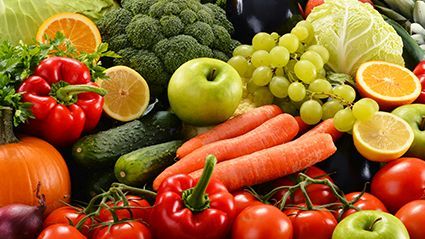THURSDAY, July 28, 2022 (HealthDay News) — Eating a rainbow of fruits and vegetables is common advice, but many Americans eat few of these nutrient powerhouses, according to a new study.
This includes adults with chronic kidney disease (CKD) who are less likely to eat fruits and veggies than similar people without the disease, said researchers from the University of Virginia (UVA) School of Medicine, in Charlottesville.
“Consuming more fruits and vegetables is strongly linked to health in many different diseases,” said Dr. Julia Scialla, a kidney specialist at UVA Health. “We worry about overall health effects when we see patients with CKD consuming low levels of fruits and vegetables. We have to be careful not to unnecessarily discourage healthy fruit and vegetable intake when we provide nutritional advice to patients with CKD, such as advice to reduce potassium intake.”
For the study, the researchers analyzed data on eating patterns from nationwide health and nutrition surveys conducted between 1988 and 2018.
The investigators found that between 1988 and 1994, 52% of respondents with CKD had low intake of fruits and vegetables, compared with 48% of people without the disease.
Between 2003 and 2010, 46% of respondents with CKD had low produce intake, compared with 41% of others.
And between 2011 and 2018, 48% of respondents with CKD had a low intake pattern, compared with 46% of others.
About 37 million adults in the United States have chronic kidney disease, according to the U.S. Centers for Disease Control and Prevention. This occurs when kidneys are unable to effectively filter waste from a person’s blood. The condition can lead to high blood pressure, heart disease and stroke.
Patients who have CKD sometimes are told to reduce potassium, a mineral commonly found in fruits and veggies. The health benefits of this advice are not known.
More studies are needed to determine whether the low intake of fruits and vegetables is a cause or result of CKD, or if other factors are involved, the study authors said in a university news release.
In addition, the researchers said that more study is needed to understand the link between fruit and vegetable consumption and CKD, and to figure out how to get all Americans to eat more produce.
“We hope that through this study and similar studies we would be able to encourage both healthy individuals and patients with chronic kidney disease to reconsider their intake of fruits and vegetables by incorporating greater varieties and amounts of unprocessed or minimally processed fruits and vegetables into their everyday diets,” said co-author Shirin Pourafshar, a nutritionist and dietitian based in Charlottesville, Va.
The findings were recently published online in the Journal of Renal Nutrition.
More information
The U.S. National Institute of Diabetes and Digestive and Kidney Diseases has more on chronic kidney disease.
SOURCE: University of Virginia School of Medicine, news release, July 26, 2022
Copyright © 2026 HealthDay. All rights reserved.

